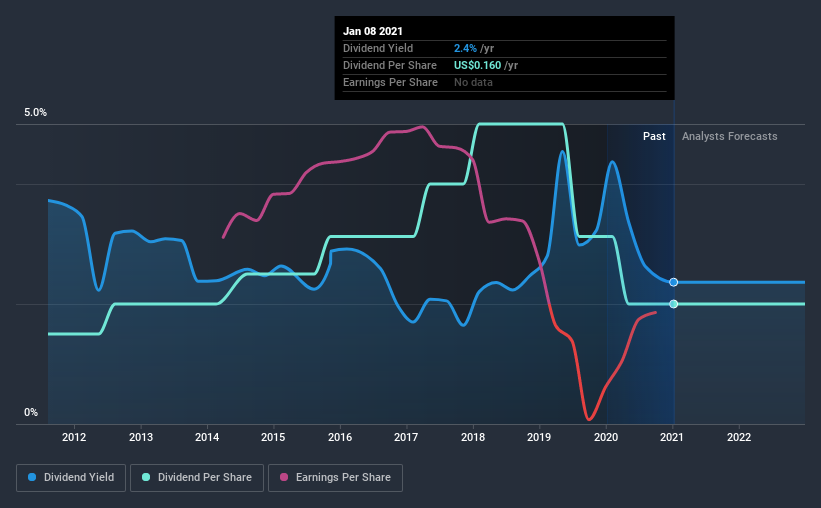- United States
- /
- Insurance
- /
- NasdaqCM:KINS
Are Dividend Investors Making A Mistake With Kingstone Companies, Inc. (NASDAQ:KINS)?

Is Kingstone Companies, Inc. (NASDAQ:KINS) a good dividend stock? How can we tell? Dividend paying companies with growing earnings can be highly rewarding in the long term. If you are hoping to live on your dividends, it's important to be more stringent with your investments than the average punter. Regular readers know we like to apply the same approach to each dividend stock, and we hope you'll find our analysis useful.
With a 2.4% yield and a nine-year payment history, investors probably think Kingstone Companies looks like a reliable dividend stock. While the yield may not look too great, the relatively long payment history is interesting. During the year, the company also conducted a buyback equivalent to around 1.3% of its market capitalisation. Some simple analysis can reduce the risk of holding Kingstone Companies for its dividend, and we'll focus on the most important aspects below.
Click the interactive chart for our full dividend analysis

Payout ratios
Companies (usually) pay dividends out of their earnings. If a company is paying more than it earns, the dividend might have to be cut. So we need to form a view on if a company's dividend is sustainable, relative to its net profit after tax. Although Kingstone Companies pays a dividend, it was loss-making during the past year. When a loss-making financial company pays a dividend, the dividend is not being paid out of profit, which is a concern if the company can't return to operating profitably.
Remember, you can always get a snapshot of Kingstone Companies' latest financial position, by checking our visualisation of its financial health.
Dividend Volatility
One of the major risks of relying on dividend income, is the potential for a company to struggle financially and cut its dividend. Not only is your income cut, but the value of your investment declines as well - nasty. The first recorded dividend for Kingstone Companies, in the last decade, was nine years ago. It's good to see that Kingstone Companies has been paying a dividend for a number of years. However, the dividend has been cut at least once in the past, and we're concerned that what has been cut once, could be cut again. During the past nine-year period, the first annual payment was US$0.1 in 2012, compared to US$0.2 last year. This works out to be a compound annual growth rate (CAGR) of approximately 3.2% a year over that time. Kingstone Companies' dividend payments have fluctuated, so it hasn't grown 3.2% every year, but the CAGR is a useful rule of thumb for approximating the historical growth.
We're glad to see the dividend has risen, but with a limited rate of growth and fluctuations in the payments, we don't think this is an attractive combination.
Dividend Growth Potential
With a relatively unstable dividend, it's even more important to see if earnings per share (EPS) are growing. Why take the risk of a dividend getting cut, unless there's a good chance of bigger dividends in future? Kingstone Companies' EPS have fallen by approximately 51% per year during the past five years. A sharp decline in earnings per share is not great from from a dividend perspective, as even conservative payout ratios can come under pressure if earnings fall far enough.
Conclusion
To summarise, shareholders should always check that Kingstone Companies' dividends are affordable, that its dividend payments are relatively stable, and that it has decent prospects for growing its earnings and dividend. Kingstone Companies is paying out a dividend despite reporting a loss; clearly a concern. Earnings per share have been falling, and the company has cut its dividend at least once in the past. From a dividend perspective, this is a cause for concern. With any dividend stock, we look for a sustainable payout ratio, steady dividends, and growing earnings. Kingstone Companies has a few too many issues for us to get interested.
Market movements attest to how highly valued a consistent dividend policy is compared to one which is more unpredictable. Still, investors need to consider a host of other factors, apart from dividend payments, when analysing a company. For example, we've picked out 2 warning signs for Kingstone Companies that investors should know about before committing capital to this stock.
We have also put together a list of global stocks with a market capitalisation above $1bn and yielding more 3%.
If you decide to trade Kingstone Companies, use the lowest-cost* platform that is rated #1 Overall by Barron’s, Interactive Brokers. Trade stocks, options, futures, forex, bonds and funds on 135 markets, all from a single integrated account. Promoted
Valuation is complex, but we're here to simplify it.
Discover if Kingstone Companies might be undervalued or overvalued with our detailed analysis, featuring fair value estimates, potential risks, dividends, insider trades, and its financial condition.
Access Free AnalysisThis article by Simply Wall St is general in nature. It does not constitute a recommendation to buy or sell any stock, and does not take account of your objectives, or your financial situation. We aim to bring you long-term focused analysis driven by fundamental data. Note that our analysis may not factor in the latest price-sensitive company announcements or qualitative material. Simply Wall St has no position in any stocks mentioned.
*Interactive Brokers Rated Lowest Cost Broker by StockBrokers.com Annual Online Review 2020
Have feedback on this article? Concerned about the content? Get in touch with us directly. Alternatively, email editorial-team (at) simplywallst.com.
About NasdaqCM:KINS
Kingstone Companies
Through its subsidiary, provides property and casualty insurance products to individuals in the United States.
Exceptional growth potential with proven track record.

